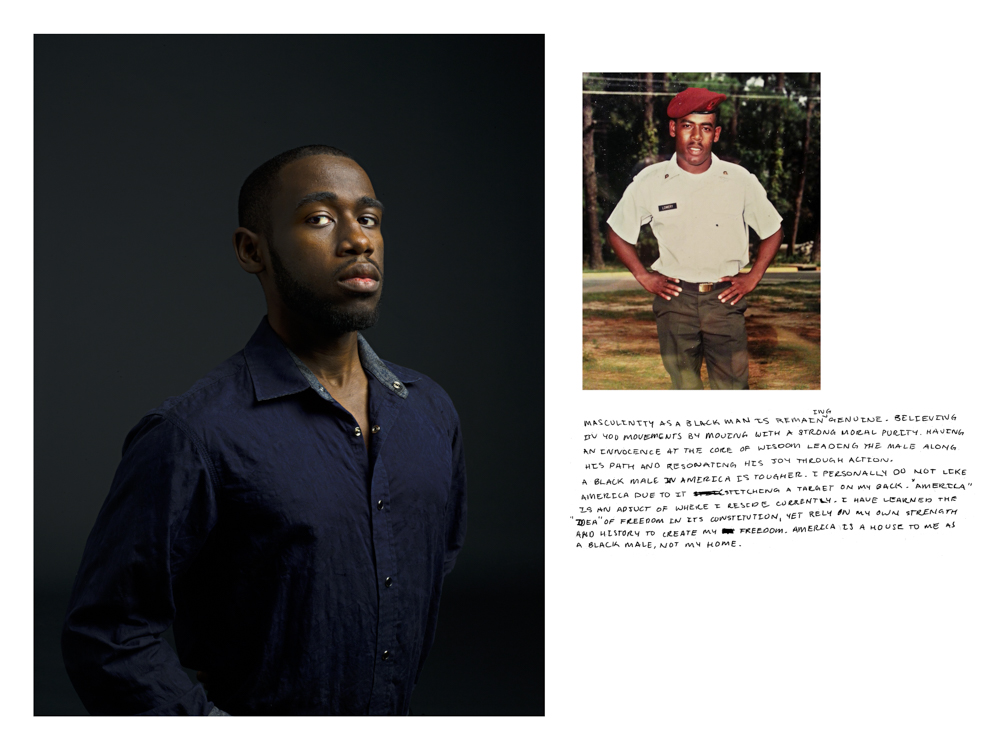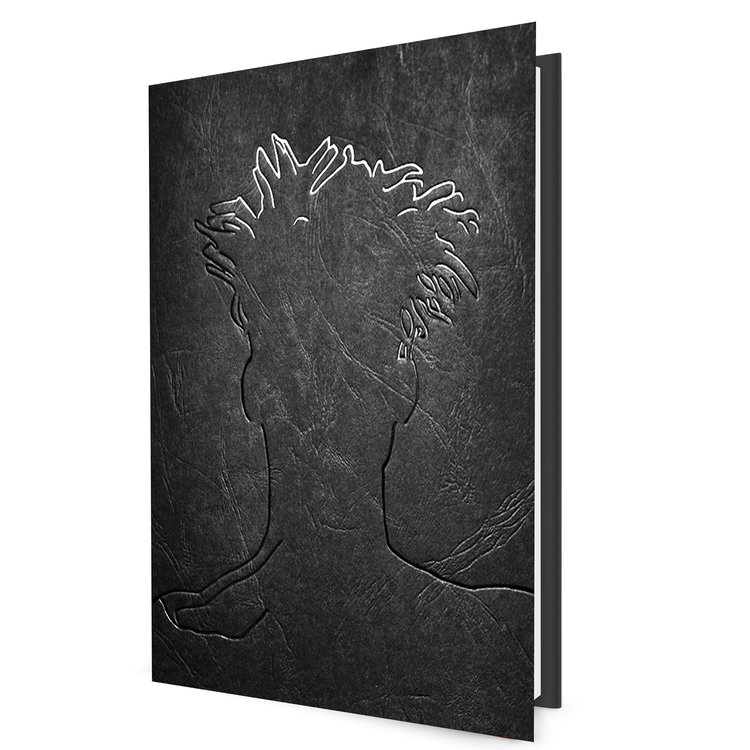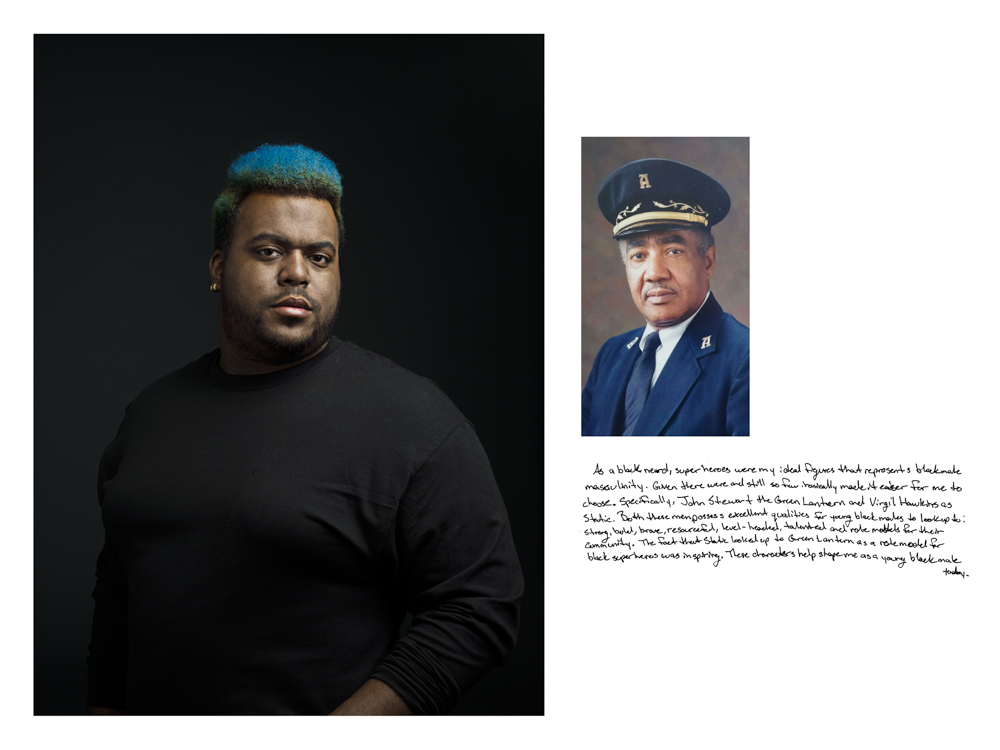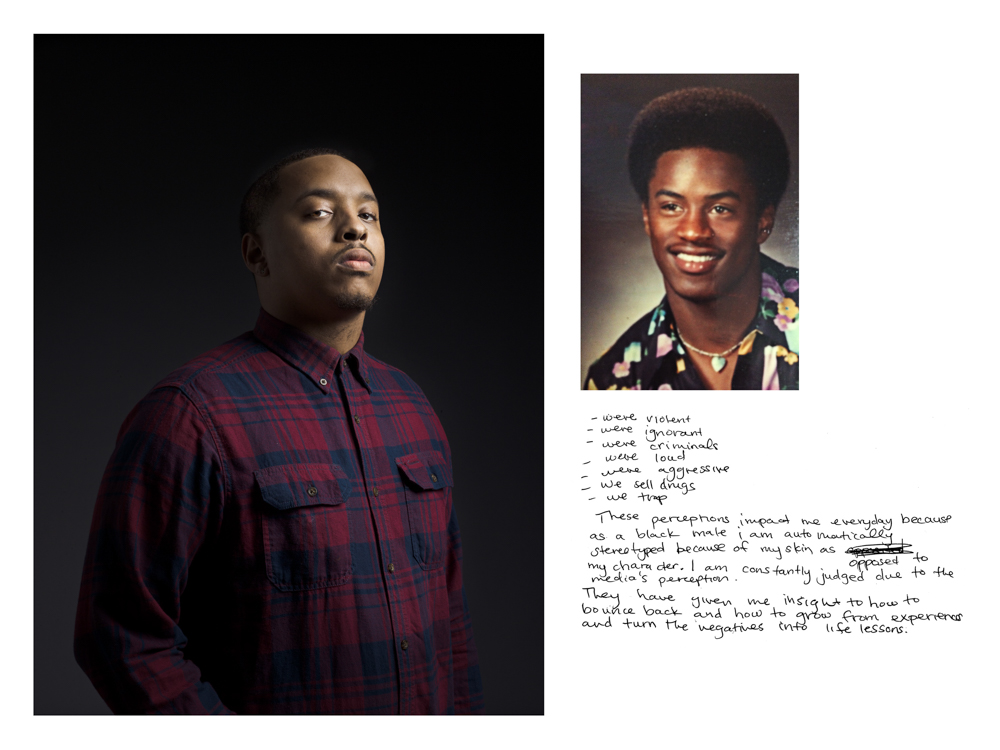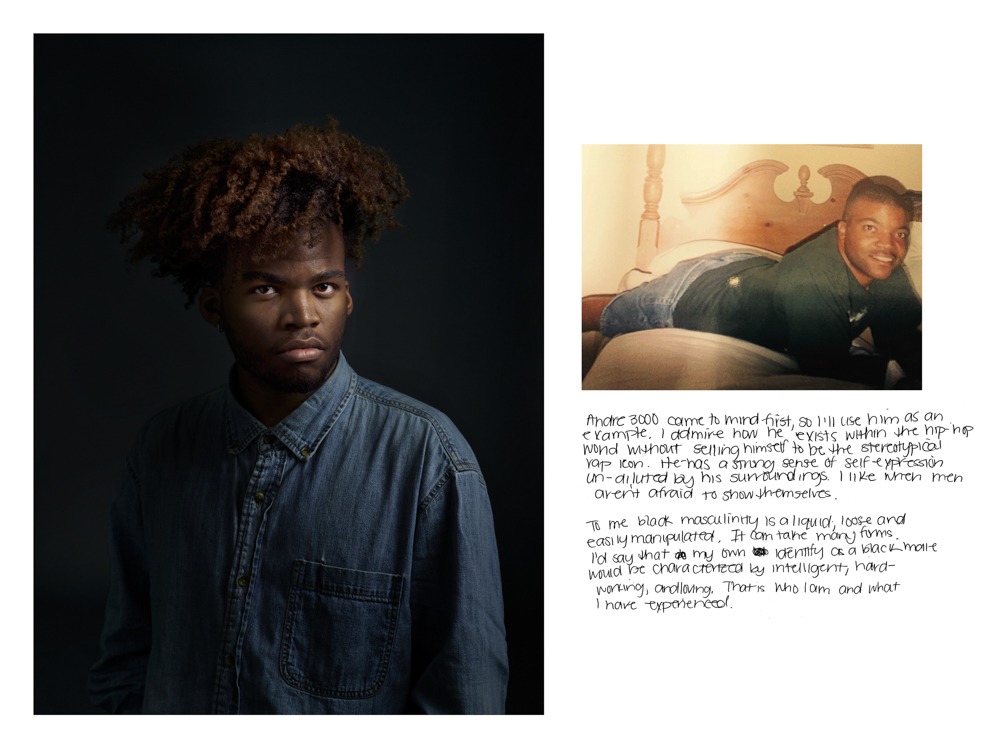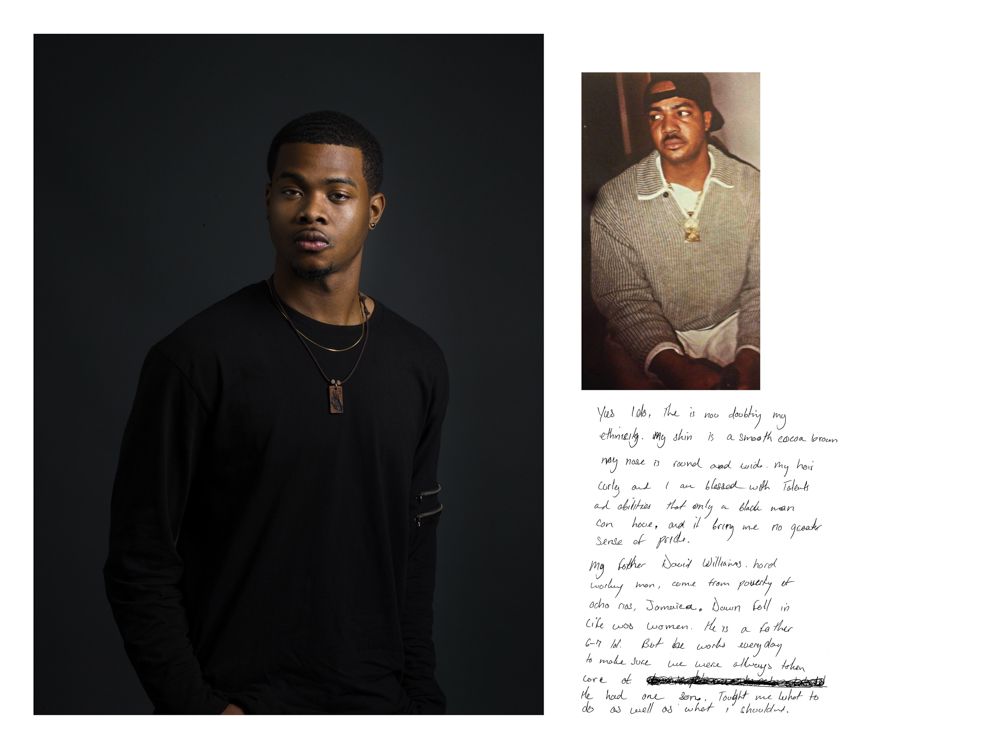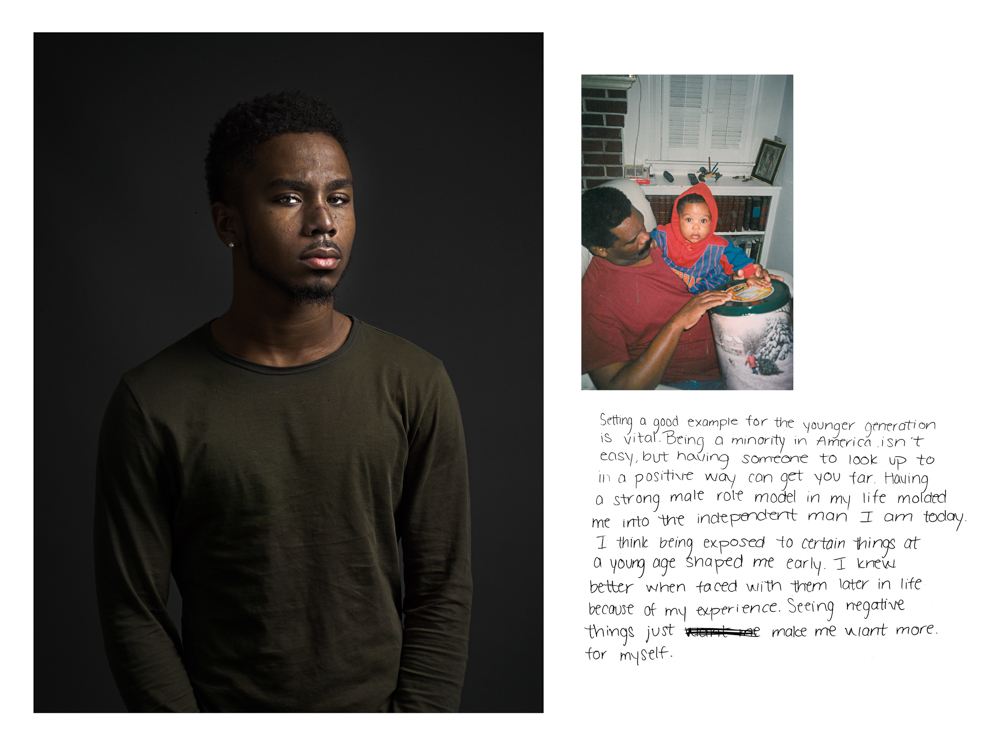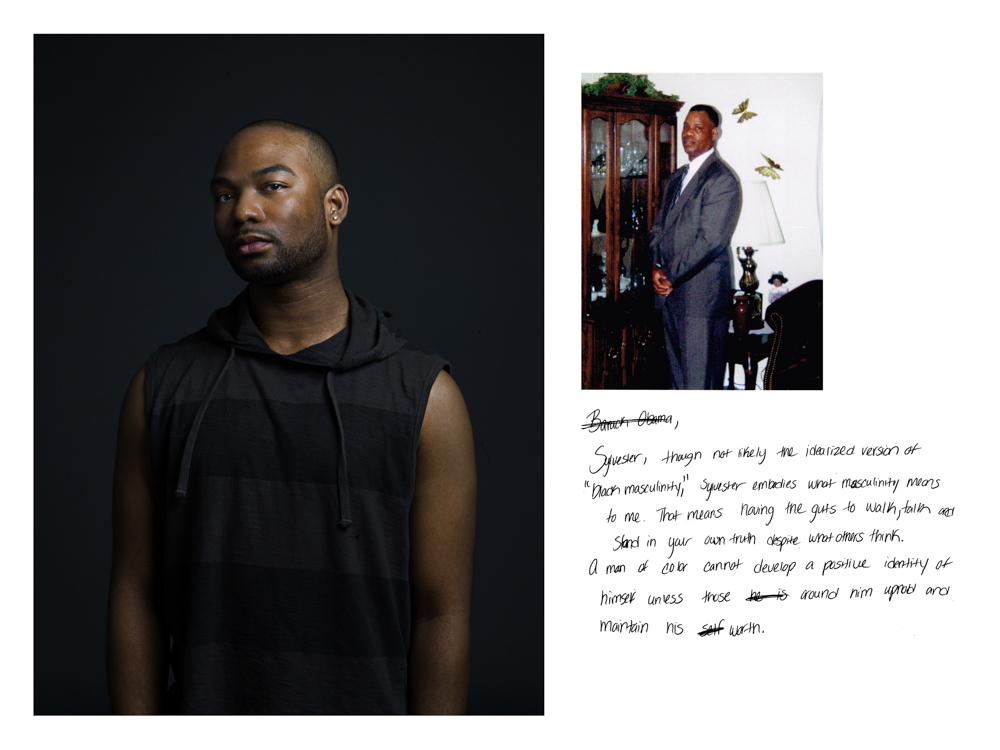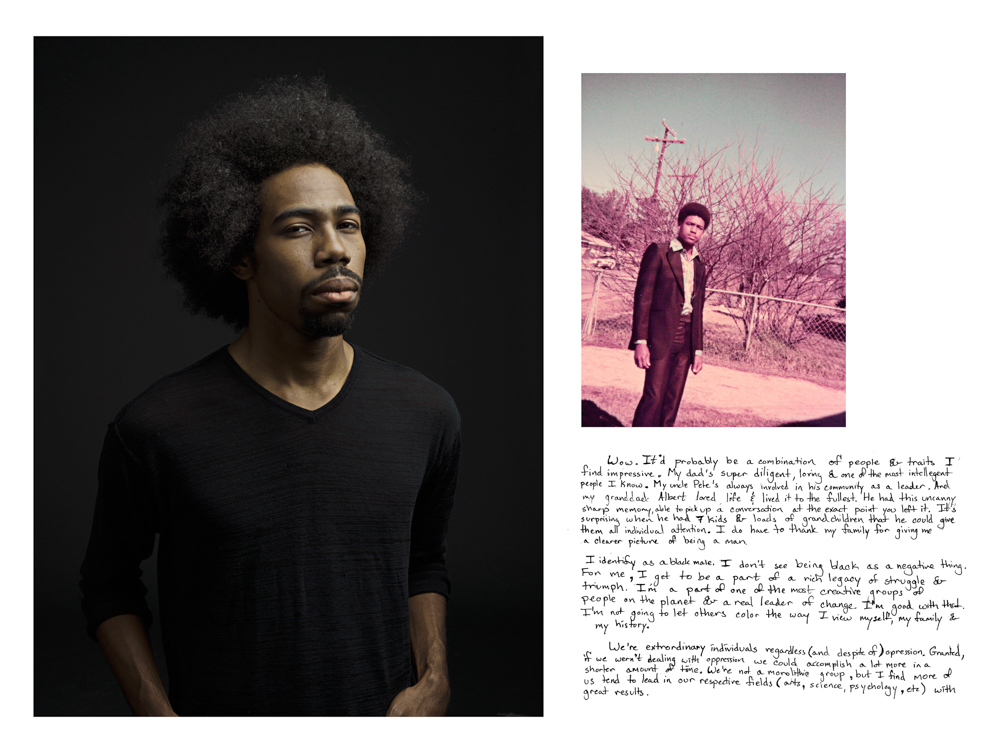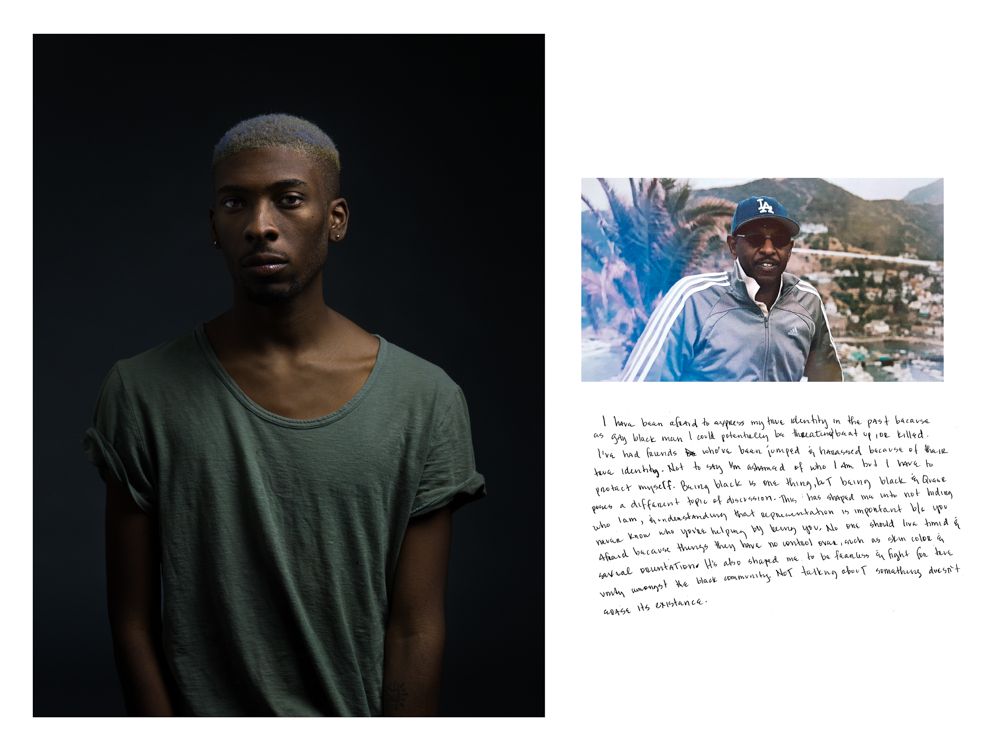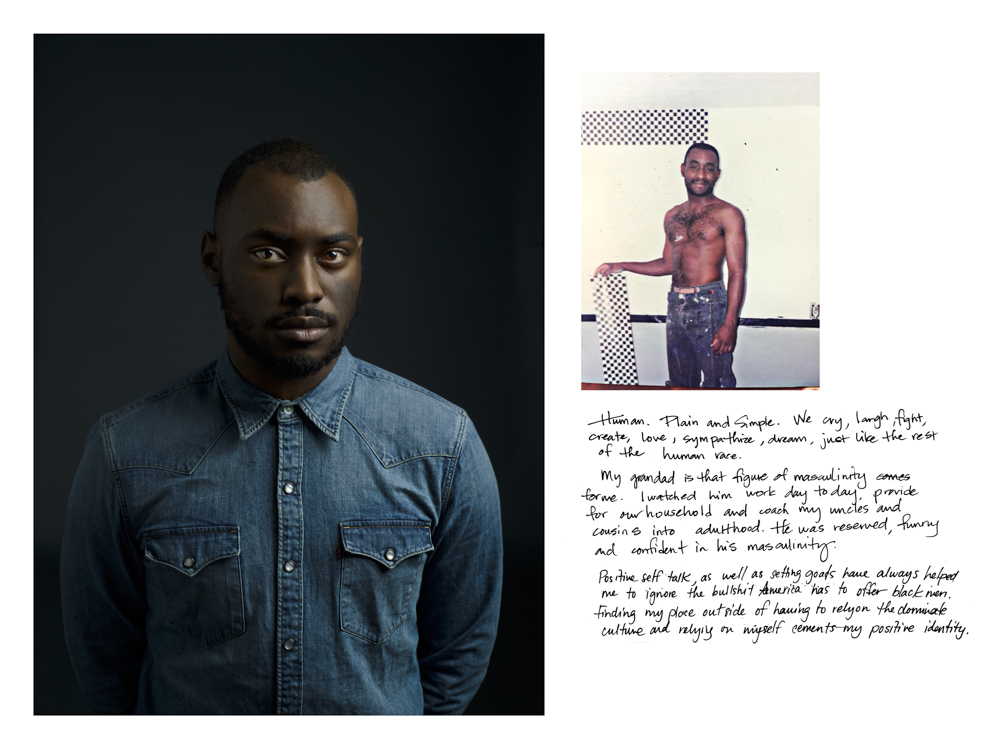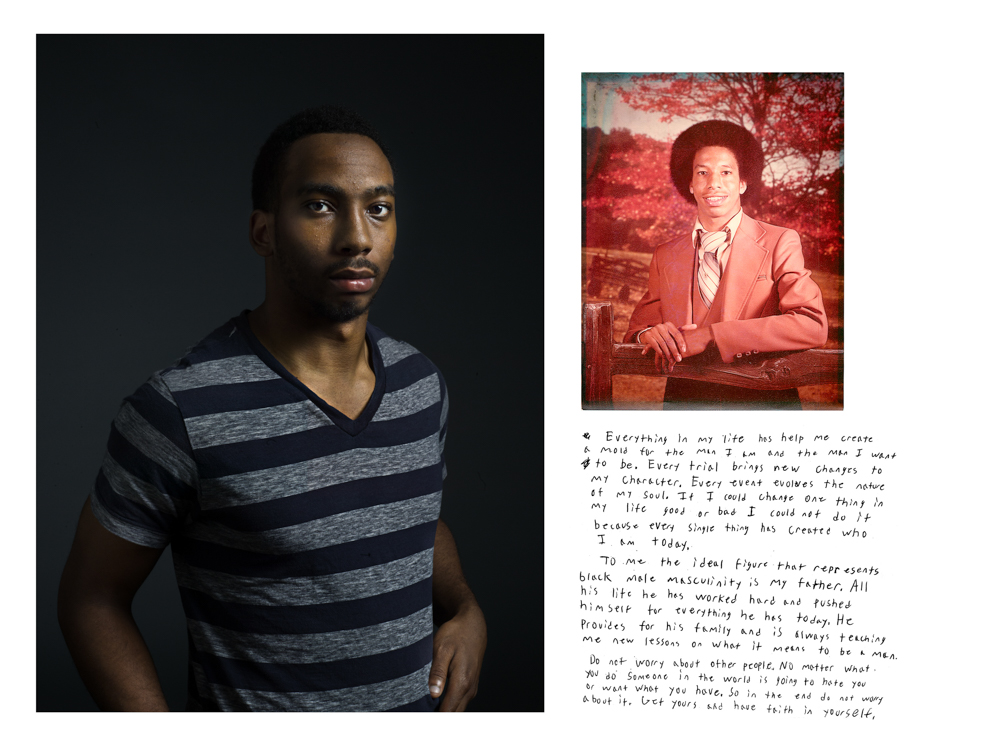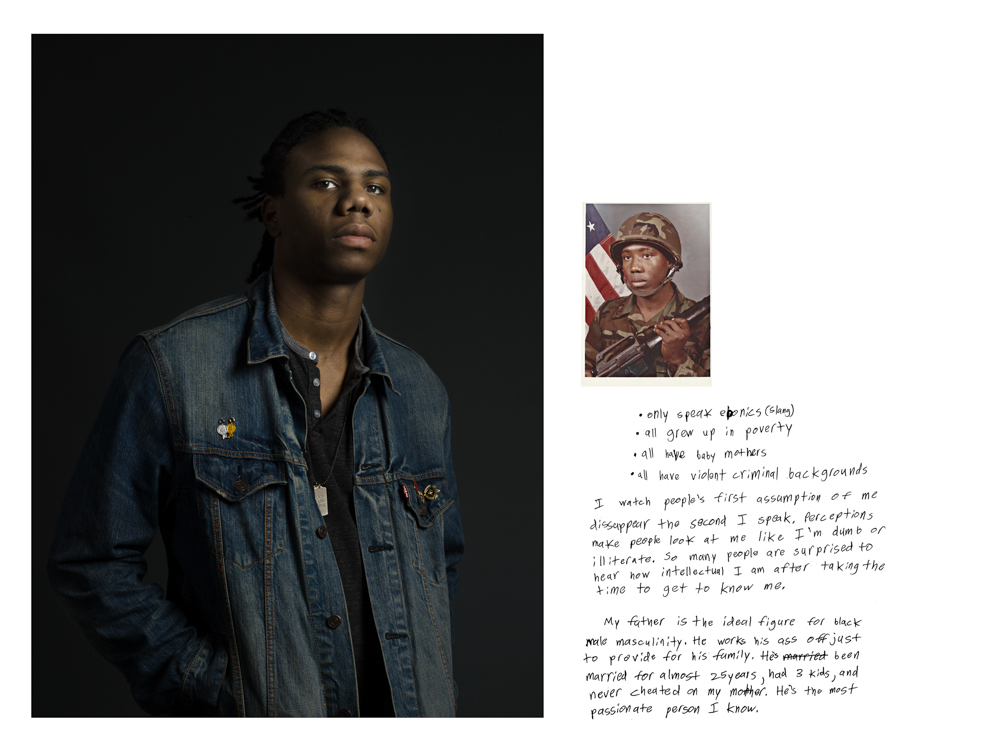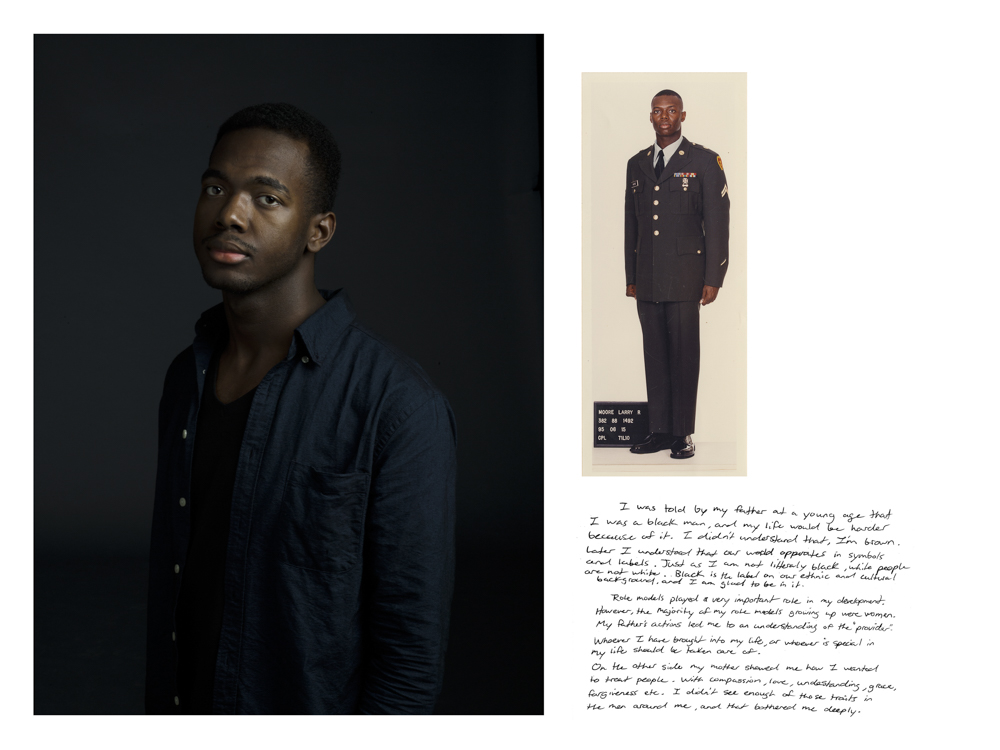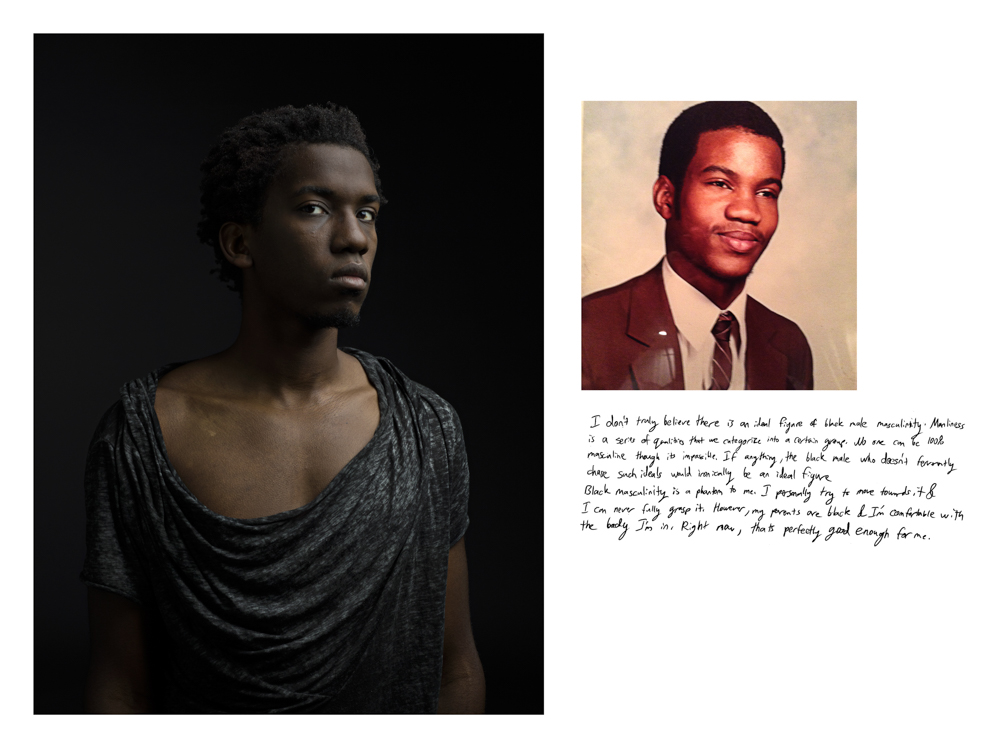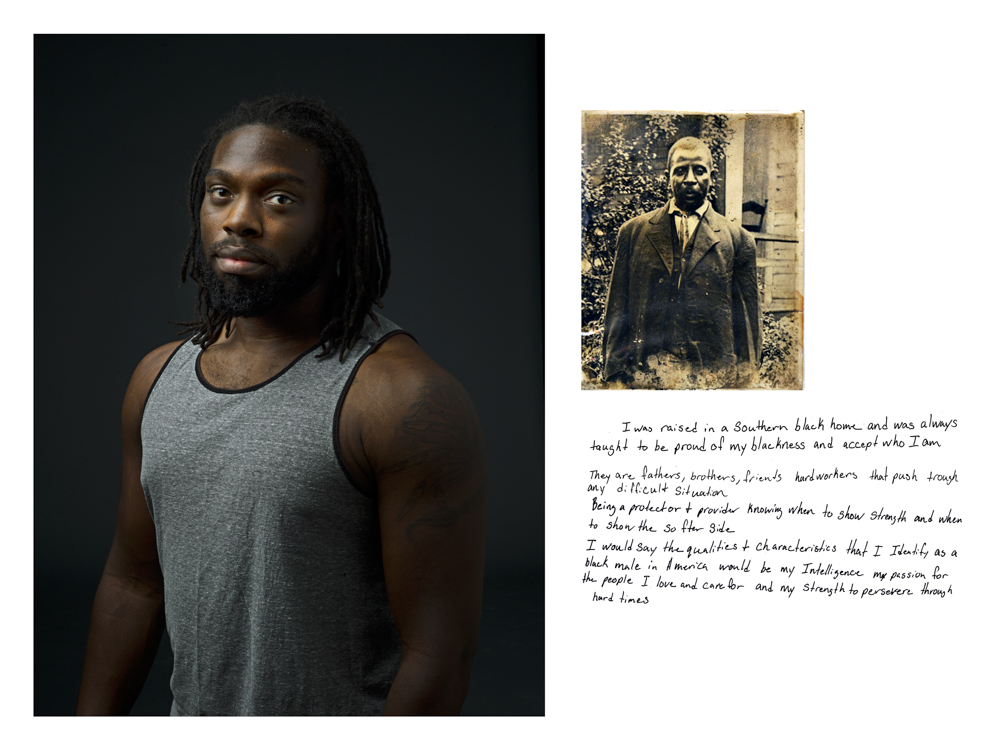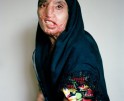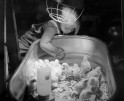Joshua Rashaad McFadden: Come to Selfhood
Masculinity as a black man is remaining genuine. Believing in your movements by moving with a strong moral purity. Having an innocence at the core of wisdom leading the male along his path and resonating his joy through action. A black male in America is tougher. I personally do not like America due to it sticking a target on my back. “America” is an adjunct of where I reside currently. I have learned the “idea” of freedom in its constitution, yet I rely on my own strength and history to create my freedom. America is a house to me as a black male, not my home. – Brian Lawrey
I’ve been thinking a lot about the painter Kerry James Marshall lately, in particular when he speaks about the need for African American artists to present figures that are self-satisfied and normalized in art so that we shift our perceptions of what it is to be Black in America. Photographer Joshua Rashaad McFadden has just done that with a powerful and important project (and book) about the African American male as he launches himself into a society of oppression and cultural landmines, probably the most critical time in a young man’s life–and a critical time in history when racism continues to rear its ugly head.
His series, Come to Selfhood, examines identity and influence as each of his subjects envisage who they are and the influences that shape their core. The subjects share an image of a father or “father figure” who most affected their lives, but more importantly, they regard what has allowed them to move into adulthood with a strong sense of self. Joshua combines portraiture, an archival portrait of their influencer at approximately the same age as the subject, and text derived from interviews with the subjects. The result is a deeper sense of who the person is and goes beyond a simple portrait. “I wanted to bring the viewer into our story, our collective story. Many times African-American males are bunched into one category of masculinity and actually a category of toxic masculinity, a violent being, which is totally not true.”
The most important and healing action that we can take as artists is to simply see each other and this project beautifully allows for a more profound understanding of the next generation of African American men.
One of his subjects, Dravon McKinnie, states about his influencer: Sylvester, though not likely the idealized version of “black masculinity,” Sylvester embodies what masculinity means to me. That means having the guts to walk, talk and stand in your own truth despite what others think. A man of color cannot develop a positive identity of himself unless those around him uphold and maintain his self-worth.
Come to Selfhood has been well celebrated and will be exhibited at the Bronx Documentary Center in New York, opening January 20th and running through March 2018, and his project After Selma will be shown in Nuremberg, Germany, March – May 2018.
The award winning Come to Selfhood, paper back, published by ©ceiba editions, is hand assembled and hand bound, with individual inserts. This limited edition book includes an interview between world renowned visual artist Lyle Ashton Harris and Joshua Rashaad McFadden.
The book ships in USA and Internationally and is available here.
Internationally recognized, award-winning artist and author Joshua Rashaad McFadden, is originally from Rochester, New York. McFadden developed an interest in art as a child. During his undergraduate years at Elizabeth City State University in North Carolina, he began to make photographs as a fine art practice. McFadden continued to develop his photography eventually attending Savannah College of Art and Design where he obtained his Master of Fine Art.
McFadden combines his passion for civil and human rights with his passion for the arts. Uprisings across America are constant because of multiple recent incidents of police brutality and the murders of African-American men and women; the result is his series After Selma. McFadden was named one of the top emerging talents in the world by LenCulture and received the first place International Photography Award (IPA, 2015) for After Selma. He won the first place IPA award again in 2016 for his series and book Come to Selfhood. McFadden has since been published and in EyesOpen Magazine, Slate Magazine, and The New York Times. In 2017 McFadden was recognized by Time Magazine as one of “12 African American Photographers You Should Follow Right Now”.
As a black nerd, super heroes were my ideal figures that represent black male masculinity. Given there were and still so few it really made it easier for me to choose, specifically, John Stewart as the Green Lantern, Virgil Hawkins as static. Both these men possess excellent qualities for young black males to look up to strong, bold, brave, resourceful, level-headed, talented and role models for their community. The fact that Static looked up to Green Lantern as a role model for black super heroes was inspiring. These characters helped shape me as a young black male today. – Brittonius Lyle
Come to Selfhood
Social activism has been the catalyst of my most recent work. Drawing from personal relationships and experiences, Come to Selfhood was created. In 2012, three significant events occurred in my life, I graduated from my undergraduate program, my grandfather, Robert McFadden, passed away, and Trayvon Martin was murdered. These moments in time sparked a greater conversation that spoke to the societal relevance and acknowledgment of the African American male experience and the notion of coming-of- age. Exploring this further led me to understand and connect my art’s overarching message that highlights the historical importance of the African American. By encouraging audiences to embrace the humanity of people who are identified as invisible, my art exposes stories that should not only be heard but affirmed and taken to heart. As I work harder to increase awareness surrounding these social ills, I see myself doing larger scale projects with a variety of moving parts that work together to create a movement that continues to positively shift the narrative of African Americans and expose sufferings, discrimination, and marginalization.
We’re violent, we’re ignorant, we’re criminals, we’re loud, we’re aggressive, we sell drugs, we trap. These perceptions impact me every day because as a black male I am automatically stereotyped because of my skin as opposed to my character. I am constantly judged due to the medias perception. They have given me insight to how to bounce back and how to grow from experiences and turn the negatives into life lessons. – Cameron Goins
Andre 3000 came to mind first, so I’ll use him as an example. I admire how he exists within the Hip-hop world without selling himself to be the stereotypical rap icon. He has a strong sense of self-expression undiluted by his surroundings. I like when men aren’t afraid to show themselves. To me black masculinity is a liquid; loose and easily manipulated. It can take many forms. I’d say that my own identity as a black male would be characterized by intelligent, hardworking, and loving. That is who I am and what I have experienced. – Christian Cody
There is no Doubting my ethnicity. My skin is a smooth cocoa brown, my nose is round and wide, my hair is curly and I am blessed with talents with only a black man can have, and it brings me a greater sense of pride. My father, David Williams, came from the poverty of Ocho Rios, Jamaica. Downfall in life was women. He is a father of 6-7. But he works every day to make sure we were always taken care of. He had one son. Thought me what to do as well as what I shouldn’t. – David Williams
Setting a good example for the younger generation is vital. Being a minority in America isn’t easy, having someone to look up to in a positive way can get you far. Having a strong male role model in my life molded me into the independent man I am today. I think being exposed to certain things at a young age shaped me early. I knew better when faced with them later in life because of my experience. Seeing negative things just makes me want more for myself. – Devin Hughes
Sylvester, though not likely the idealized version of “black masculinity,” Sylvester embodies what masculinity means to me. That means having the guts to walk, talk and stand in your own truth despite what others think. A man of color cannot develop a positive identity of himself unless those around him uphold and maintain his self-worth. – Dravon McKinnie
Wow. It’d probably be a combination of people and traits I find impressive. My dad’s super diligent, loving and one of the most intelligent people I know. My uncle Pete’s always involved in the community as a leader. And my granddad Albert loved life and lived it to the fullest. He had this uncanny sharp memory, able to pick up a conversation at the exact point you left it. It’s surprising when he had seven kids and loads of grandchildren that he could give them all individual attention. I do have to thank my family for giving me a clearer picture of being a man.
I identify as a black male. I don’t see being black as a negative thing. For me, I get to be a part of a rich legacy of struggle and triumph. I’m a part of one of the most creative groups of people on the planet and a real leader of change. I’m good with that. I’m not going to let others color the way I view myself, my family and my history. – Jamel Jones
I have been afraid to express my true identity in the past because as a gay black man I could potentially be threatened, beat up, or killed. I’ve had friends who’ve been jumped and harassed because of their identity. Not to say I’m ashamed of who I am, but I have to protect myself. Being black is one thing, but being black & queer poses a different topic of discussion. This has shaped me into not hiding who I am, & understanding that representation is important because you never know who you are helping by being you. No one should live timid and afraid because of things they have no control over, such as skin color and sexual orientation. It’s also shaped me to be fearless & fight for true unity amongst the black community. Not talking about something doesn’t erase its existence. – Jeremiah Thompson
Human. Plain and simple. We cry, laugh, fight, create, love, sympathize, dream, just live like the rest of the human race.
My granddad is that figure of masculinity for me. I watched him work day to day, provide for our household and coach my uncles and cousins into adulthood. He was reserved, funny and confident in his masculinity.
Positive self-talk, as well as setting goals, have always helped me ignore the bullshit America has to offer black men. Finding my place outside of having to rely on the dominant culture and relying on myself cements my positive identity. – Johnathan Marshall
Everything in my life has helped me create a mold for the man I am and the man I want to be. Every trail brings new changes to my character. Every event evolves the nature of my soul. If I could change one thing in my life good or bad, I couldn’t do it because every single thing has created who I am today.
To me, the ideal figure that represents black male masculinity is my father. All his life he has worked hard and pushed himself for his family and is always teaching me new lessons on what it means to be a man.
Do not worry about other people. No matter what you do someone in the world is going to hate you or what you have. So in the end, do not worry about it. Get yours, and have faith in yourself. – Jonathan Magee
-Only speak ebonics (slang)
-All grew up in poverty
-All have baby mothers
-All have violent criminal backgrounds.
I watch people’s first assumption of me disappear the second I speak. Perceptions make people look at me like I’m dumb or illiterate. So many people are surprised to hear how intellectual I am after taking the time to get to know me.
My father is the ideal figure for black male masculinity. He works his ass off just to provide for his family. He’s been married for almost 25 years, had three kids, and never cheated on my mother. He’s the most passionate person I know. – Kamall Browne
I was told by my father at a young age that I was a black man, and my life would be harder because of it. I didn’t understand that; I’m brown. Later I understood that our world operates in symbols and labels. Just as I am not literally black, white people are not white… Black is the label on our ethnic and cultural background, and I am glad to be in it.
Role models played a very important role in my development. However, the majority of my role models growing up were women. My father’s actions lead me to an understanding of the “provider”. Whoever I have brought into my life, or whoever is special in my life should be taken care of. – Lamarr Moore
I don’t truly believe there is an ideal figure of black male masculinity. Manliness is a series of qualities that we categorize into a certain group. No one can be 100% masculine though, it’s impossible. If anything, the black male who doesn’t chase such ideals would ironically be an ideal figure.
Black masculinity is a phantom to me. I personally try to move towards it and I can never fully grasp it. However, my parents are black and I’m comfortable with the body I’m in right now, that’s perfectly good enough for me. – Matt Cornwall
I was raised in a southern black home and was always taught to be proud of my blackness and accept who I am. They are fathers, brothers, friends, hard workers, that push through any difficult situation. Being a protector and provider knowing when to show strength and when to show the softer side. I would say the qualities and characteristics that I identify as a black male in America would be my intelligence, my passion for people I love and care for and my strength to preserver through hard times. – Raheem Pounds
Posts on Lenscratch may not be reproduced without the permission of the Lenscratch staff and the photographer.
Recommended
-
Scott Offen: GraceDecember 12th, 2025
-
Izabella Demavlys: Without A Face | Richards Family PrizeDecember 11th, 2025
-
2025 What I’m Thankful For Exhibition: Part 2November 27th, 2025
-
2025 What I’m Thankful For Exhibition: Part 3November 27th, 2025
-
2025 What I’m Thankful For Exhibition: Part 4November 27th, 2025

